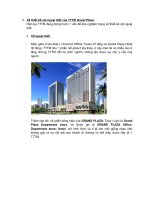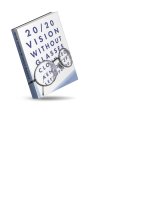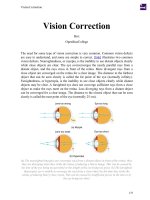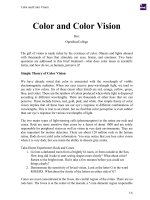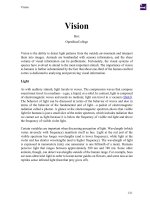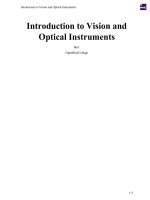Grand Vision
Bạn đang xem bản rút gọn của tài liệu. Xem và tải ngay bản đầy đủ của tài liệu tại đây (251.63 KB, 18 trang )
1
G R A N D V I S I O N.
By
J.M.P.Cole.
AUTHOR :
J.M.P.Cole,
Lot 249, Claremont Resort,
431 Park Ridge Road,
Park Ridge, Q. 4125.
AUSTRALIA.
Approximately 86,000 words. Copyright J.M.P.Cole, 2003.
This novel is a book of fiction. All characters and their thoughts and utterances are entirely fictitious and any
resemblance to any real person, whether alive or dead, is unintended and completely coincidental.
All rights are reserved. No part of this publication may be reproduced or transmitted in any form without approval
FLYLEAF.
There is a tide in the affairs of men
which, taken at the flood, leads on to fortune;
omitted, all the voyage of their life
is bound in shallows and in miseries.
On such a full sea are we now afloat,
and we must take the current when it serves,
or lose our ventures.
William Shakespeare - Julius Caesar, 1V:3
POLITICIANS’ FOREWORDS.
The distortion of the democratic function in Australian politics because of party discipline was the very reason I
resigned from the Liberal Party and formed The Australian Democrats in 1977, demanding that an essential feature of
its structure be that every parliamentary member of the party should not only be entitled to vote but have a basic
obligation to vote either according to their conscience or for the interests of their constituents as they perceive them
after a sincere consensus seeking discussion with their colleagues.
Author Mike Cole's novel, GRAND VISION, will be criticised by the shallow-minded political commentators
of Canberra but will be welcomed by those thinking Australians who hold the old fashioned view that elected
politicians should dare to vote in accordance with the interests of those people who put them into parliament.
DON CHIPP.
Founder of The Australian Democrats.
- 0 – 0 – 0 – 0 – 0 -
I enjoyed Grand Vision by J.M.P.Cole, which I believe presents an interesting concept in political democracy. Mr.
Cole has a deep understanding of the Australian political scene and has tapped into the inequities of the party political
system. As an Independent State politician I agree with him that many politicians do not truly represent their
constituents but follow the party line.
2
My battle cry for my foray into State politics was "The People's Voice not the Party's Puppet" and it was very
effective. My endorsement of the Beattie Labor Government handed me the balance of power in this State, but I realise
that in general Independent politicians are in the political wilderness. I therefore fully endorse Mr Cole's idea of an
Independent Party comprising politicians who truly represent their constituents on all matters and vote accordingly in
Parliament.
PETER WELLINGTON MLA
Member for Nicklin (Queensland State Parliament)
PROLOGUE.
With the rifle cradled in his arms he sat on top of the high ground alongside the highway where it ran through the
cutting two hundred metres from the bridge across Scrubby Creek.
Hidden behind a low sparse bush he was invisible to motorists. His slouch hat had twigs and leaves stitched to
it. His face and hands were streaked with dirt. The rifle had been painted in irregular stripes with non-reflective paint,
light brown and grey green, the colours of the Australian bush. Hanging from his belt was a mobile telephone.
The time was six forty-two and according to the call two minutes earlier he should have less than a minute to
wait.
He settled into a comfortable shooting position, eased off the rifle's safety catch and stared intently down the
road to the bend five hundred metres distant.
The seconds ticked slowly away as he waited. The increasing warmth of the sun brought beads of perspiration
to his forehead and to the palms of his hands. He dried his forehead under the brim of his hat with his shirtsleeve and
wiped his palms on his trouser legs.
The car came round the bend, travelling fast.
He raised the rifle immediately but unhurriedly, knowing that the vehicle would take eleven seconds to travel
the three hundred metres to the bridge. He watched it through the telescopic sight, checking description, registration
plate and the driver's features.
Lining up the sight on his target he held his breath for steadiness and softly took up the slight slack of the
trigger.
When the car reached the thin guide post thirty metres from the bridge he gently squeezed the trigger.
CHAPTER 1.
As the red On Air light in the Channel Five studio lit up, Christine Jordan looked straight into the eye of the central
television camera.
"Good evening," she said. "I'm Christine Jordan and my first guest tonight is the Prime Minister of Australia,
The Right Honourable Rex Marlow." She turned towards Marlow, her long, raven-black hair swirling lightly around
the tops of her shoulders. "Welcome to Question Time, Prime Minister," she smiled, masking her loathing.
"Thank you, Christine. It's a pleasure to be here," Marlow replied, feeling perspiration starting to form on his
forehead but not wanting to reach for his handkerchief straight away. Already he could feel the back of his shirt
becoming clammy under his coat. God, how he hated these TV studio interviews, with the heat generated by the stage
lighting enveloping him. He should have pleaded a prior engagement because, apart from the heat and the physical
discomfort, it was almost certain this tricky bitch would try to stick a knife or two into him.
When she'd made her request for the interview she'd said she wished to discuss the settlements for the Voyager
disaster victims which the Attorney General's department had announced the previous day, but he knew from past
experience that once these TV interviewers had you live on camera in front of an Australia-wide viewing audience,
they could ask you anything they liked and pin you to the wall with embarrassing questions. He'd been foolish to
agree. A weak performance tonight could drop him four or five points in the opinion polls and he couldn't afford that
during the run down to the approaching election.
Well, she wasn't going to get the better of him. No smartypants female was going to make him look like a fool.
Certainly she was very astute and on top of the TV ratings at present but she was still new in her job whereas he'd been
in Federal Parliament for twenty-five years, a Cabinet Minister for nine of them and Prime Minister for these last two.
Christine noticed his uneasiness. That's good, she thought. I love it when they sweat. Well, suffer you swine.
Tonight is for me. Tonight is retribution time. "Prime Minister," she said, "yesterday afternoon your Attorney
General's department announced that a total of eighty-eight claims for damages arising out of the Voyager disaster
were to be settled out of court for some forty-five million dollars. Is that correct?"
3
"Yes, Christine. Our Attorney General, I'm pleased to say, has worked very hard to bring this matter to a
speedy and equitable conclusion and my Government is very happy to be generously compensating those fine men
who suffered so grievously."
"I'm sure you are, Prime Minister," said Christine, green eyes flashing, "because these claims seem to have
been in the Too Hard Basket for ages. As I understand it, on the tenth of February 1964, THIRTY YEARS AGO, our
Australian aircraft carrier, HMAS Melbourne, accidentally rammed and sank our destroyer, HMAS Voyager, during
nighttime training manoeuvres off Jervis Bay. Eighty-two young crewmen died and over a hundred others were
injured, some very seriously. Is that right?"
"Yes, Christine. I'm not sure of the exact numbers but those were the circumstances."
"But THIRTY YEARS to settle these claims, Prime Minister? That's an awfully long time, isn't it?"
There it was. The first of the knives. He'd sensed all along that this bitch would try to stab him. He squirmed a
little in his chair and patted the perspiration from his forehead with his handkerchief. He could feel it forming all over
his big bloated body.
"Christine, our Australian Labor Party was not in government when the sinking occurred," said Marlow. "Our
opponents, the Liberal/National coalition, were in power at the time and for most of the next twenty years. They
blundered around for ages, holding two Royal Commissions to find out who was to blame. Then all the legal eagles
came into the picture and the Libs thought it was too messy and they shelved it. They didn't care about those poor
devils."
"Well, what happened when Labor came back into power? You were a Cabinet Minister then, weren't you?
Why did it take another eleven years? Thirty years after the sinking occurred."
He could almost see the knife in her hand. He could almost feel its cold, sharp point pricking the skin between
his ribs. Perspiration was soaking his clothing. He reached again for his handkerchief. He knew there was no valid
excuse. Thirty years was a national disgrace. He'd just have to keep talking around and around the subject without ever
answering the question.
"Christine," he said, trying to sound as composed as possible, "the only thing that matters is that my
Government has compensated those fine men very generously. These claims average more than half a million dollars
each. That's a very satisfying result for those fine men and I'm sure they're all very grateful."
"But THIRTY YEARS, Prime Minister?"
"Over half a million dollars each, Christine. That's what we've given them."
"But they should have been paid much sooner, shouldn't they?"
"Christine, when we took over from the Libs, the country was in a mess. We settled these claims very
generously and as quickly as possible. We really looked after those fine deserving men. Over half a million dollars
each."
Christine looked piercingly at him. A vision of her dead father, huddled in his wheelchair, flashed before her
eyes. "I find that a very remarkable statement, Prime Minister," she said, "when I have here a note from you to the
Attorney General dated two years ago, and authenticated by a handwriting expert as being in your own handwriting,
which says, and I quote, Jim, put off these Voyager claims as long as possible. They're just a mob of whinging
bludgers anyway, and signed, Rex. Would you like to comment on this, Prime Minister?" she added, holding up the
note while Channel Five flashed a transcript on the screen.
For a moment or two Marlow was speechless. Hell! How had she got hold of that? Why hadn't Jim destroyed
it? His body felt paralysed, his mind almost a blank. Then twenty-five years of parliamentary experience and training
came to his aid.
"Christine, that's obviously a forgery," he lied, straightening up in his chair and striving to sound believable. "I
know absolutely nothing about it."
"Well, Prime Minister, we might leave it to our viewers to decide on that," said Christine. "Thank you for
speaking with me this evening."
And on that cue, Channel Five went to a commercials break.
Mark Radford, tall, fair-haired, walked out of the National Australia Bank premises in East Street and headed for
where his Jaguar XJS Coupe was parked. He had just deposited to his current account the largest cheque he had ever
personally seen, after he and his partner, Trevor Johnson, had sold their software company to one of the southern
giants.
He knew he would miss Trevor and their daily and nightly involvement in the business but the deal had been
too good to even consider refusing. It was nine years now since he'd said to Trevor over a beer one day in Yeppoon,
well, if there's that much money in it why don't we start up our own company. Nine years of hard, grinding, persistent
effort. Longer than he'd stayed in any job and in any town since Tracey had died.
4
Together they'd forged a highly successful business, Trevor providing the technical expertise and Mark the
commercial knowledge and marketing flair. After a slow inauspicious start in a tiny shop in North Rockhampton,
they'd picked up several good service accounts and the business had started to flourish. Twelve months later they'd
moved into larger premises and were employing four people. Now, at their time of selling, Rocky Resolutions was a
multi-million dollar business.
He looked at his watch. A little after three thirty. Time to go back to his unit and start packing. Also he'd ring
his brother, Barry, in Townsville to let him know he'd be coming up there for a few days. He'd ring the Aquarius On
The Beach as well, to book himself in and he'd ring Ma and The Old Feller at Kooralbyn, tell them the news and that
he'd be down there in about a fortnight for a few weeks.
He could imagine the reaction at Kooralbyn. His mother would be ecstatic about having him home for a while
but worried that he'd sold the business and didn't have a job. Several million dollars in the bank would not cancel out
her fear of him being unemployed in these hard times with 10% of the workforce, nearly a million people, looking
unsuccessfully for work.
She was unbelievable. A real sweetie, but definitely unbelievable. He chuckled softly to himself.
In his orchard in Kooralbyn Valley, near Beaudesert, south of Brisbane, Bruce Radford was spraying his fruit trees to
shield them from the dreaded fruit fly. With goggles, protective clothing and spray pump he looked like a typical
hobby orchardist. He didn't look at all the type of person to be planning the overthrow of the Federal Government and
major alterations to the nation's electoral system.
"Bruce! Afternoon tea!"
He turned round. Lilla was standing in the shade of the scarlet covered Poinciana at the rear of their house.
"OK," he called back. "Coming now."
He trudged back from the orchard and joined her in the garden room, a pergola-covered paved area on the
western side of their low set brick and tiled home. With its slatted roof, which could be opened or closed, it was a
wonderfully cool place on summer days. Today was hot and dry but their garden room, with its luxuriant tropical
plants, was a cool, moist haven.
"How's the spraying coming along?" asked Lilla, handing him his large mug of white tea. At sixty-four she
was a good-looking woman who had obviously been beautiful in her younger days. After years of fighting the greying
process with colour rinses her hair was now completely white and waved and curled to her shoulders. Bruce called her
his Snow Queen.
"I should have it finished today," he said. He sipped his tea and stared out across the valley. The view was
breathtakingly beautiful. The valley browned off during the winter months from cold weather, frosts and sparse
rainfall but now, after several months of storms and warm weather, the lakes were full and the grass was lush and
green.
"I was thinking while I was spraying," said Bruce, "what a great job that Christine Jordan did on Rex Marlow
last night. Nailed him to the woodwork, didn't she?"
"She certainly embarrassed him," said Lilla. "I don't think I've ever seen him so nonplussed before."
"She'd make a great Prime Minister," he mused. "Just the person to head up my new Independents' Party, kick
out today's dreadful government and get rid of our disastrous two-party system."
He grinned at Lilla.
"Don't tell me you're on your hobby horse again," she said, raising her eyebrows. "I couldn't stand another
session on the wrongs of the country and how to fix them. Let's just have a nice cup of tea and look at the view."
Before Bruce could reply, the telephone began ringing in the lounge room.
Lilla went to answer it. Their married daughter, Alison, rang regularly, as did their son Barry's wife, Leanne,
while their elder son, Mark, who was still single, rang at infrequent intervals. Apart from them, most of the calls were
from Lilla's women friends in the valley or from a handful of old timers in Brisbane and elsewhere.
He began thinking about Christine Jordan again and about his Grand Vision but he kept one ear cocked to hear
who was calling.
"Mark! How lovely of you to ring!"
He could hear the excitement in Lilla's voice and his heartbeat quickened. He put his mug down on the table,
rose stiffly to his feet, and went to join her in the lounge room. This was quite an occasion. Mark hadn't rung since
he'd holidayed with them several months ago.
On his drive from Rockhampton to Townsville, Mark Radford was not in a hurry and the olive-green XJS cruised
along comfortably with the speedo needle hovering around the hundred mark. He reached Mackay a little after midday
and filled up with petrol at one of the numerous service stations on Nebo Road. He ate a hamburger and drank a mug
of coffee in its cafe and then took off again.
5
He could have arranged to meet some of his old friends from the Racecourse Mill, where he'd worked for a
couple of months several years before, but he'd decided to give them a miss today. They would have wanted to have a
beer or two ... or more, but he never drank alcohol when he was driving long distances. He would spend an evening
with them on his way back south to Kooralbyn. Probably stop at Bundaberg for a day or two also.
The Bruce Highway was almost like home to him. For twelve years he'd travelled up and down it and worked
in many of the towns from Brisbane to Cairns. Today, as he headed ever northward, with nothing to do but watch the
road and the speedo needle, memories came flooding back.
It was just on 5.00 pm when he slowed at the sixty K speed limit sign for the run into Townsville. The Friday
afternoon traffic was thickening as he wended his way through the centre of town, heading for the beach.
The fourteen storey Aquarius hotel is on The Strand, which runs from Ross Creek to Kissing Point, and he'd
told Barry he'd check into his suite first, ring to confirm his arrival and then drive up to Barry's house. Barry wouldn't
be home from the factory when he rang but Leanne and the girls would be there.
When he picked up the telephone in his suite and rang Barry's number his watch was showing 5.27 pm. He
was quite surprised when Barry himself answered the call. He was shocked when he found out why.
At the time Mark Radford was slowing for the run into Sarina, around eleven thirty in the morning, Rex Marlow, in
his Canberra office, was ranting at his Deputy Prime Minister, Len Straun.
"These ratings are shocking, Len," he stormed. "The party's down to 37% with the Libs up to 44 and my own
rating's down to 19. I've dropped eight points since that bitch hit me on Wednesday night. Damn her! We've got to fix
her somehow, Len, or we're goners at the next election."
"It's certainly not too good at the moment, Rex," said Len Straun quietly.
"Not too good! It's a bloody disaster! We've got to do something about her. Any ideas?"
"Well, there's not much we can do, except perhaps don't do any more interviews with her."
"What! Just go away and hide? Come on now. Look what she did to Bill Williams when he did that. She
crucified him night after night for not being willing to speak with her. And she's made goats out of three others of our
Ministers lately with leaked information, like she hit me with."
"Yes, she's a major problem. We're going to have to find out the source of those leaks."
"And quick smart, Len. We can't afford another disaster like Wednesday night. And why Jim didn't destroy
that note of mine is beyond comprehension. I've told him one more slip and he's out! Stupid bastard!"
"Well, I'll organise an operation to try to find the source or sources of the leaks straight away, Rex. If we can
close off her supply we should nullify her."
"I doubt it. Not completely. We've got to go further than that. We've got to get her off the air ... one way or
another."
"But how?"
Marlow's face tightened into an evil grin. "Never you mind," he snarled. "I've got a few plans for this bitch.
Now, get out of here. I've got a couple of phone calls to make to get things started."
That Friday evening, after Mark Radford rang his brother, Barry, from the Aquarius hotel, all the television channels
carried segments in their news bulletins about the closure of the Anderson's Clothing Company in Townsville. Two of
them also had five minute allocations in their later current affairs shows while Channel Five devoted the whole of its
half-hour Question Time program to the closure.
The news had broken mid-morning with a media release in Townsville by the company's Managing Director
and had spread quickly throughout Australia.
As soon as it came to her ears, Christine Jordan commandeered Channel Five's Citation 3 jet, organized her
special camera crew and flew straight to Townsville.
Prior to landing, and with permission from Air Traffic Control, they circled the city and suburban areas and
shot several minutes of aerial views showing Castle Hill, the main commercial area, Magnetic Island, the Breakwater
Casino and as far inland as James Cook University, the Lavarach Barracks army establishment and the three thousand
foot Mount Stuart with the local television and radio stations' transmission masts on its rugged summit. They also
showed close-ups of the Anderson's Clothing Company premises spreading over several hectares just south of Ross
River.
After they'd landed, Christine stepped out of the aircraft's air-conditioned interior into the searing afternoon
heat of a typical North Queensland summer day. It was like standing in front of the open door of a blast furnace. Her
senior pilot, Jim Landers, helped her down the aircraft's folding steps.
"Welcome to the tropics, Christine," he grinned.
6
Mark Radford grabbed his younger brother in a bear hug. "I'm so sorry, Barry," he said. He turned to Leanne and gave
her a friendly hug and a kiss on the cheek. "I told you he was a rotten accountant," he joked. He then picked up their
two daughters in turn, Belinda, aged six and Roseanne, nearly two years younger, kissed them, hugged them to him,
twirled them around in the air and put them down again, squealing with delight.
As he followed Barry and Leanne through their house to the covered patio at the rear with its panoramic view
overlooking Cleveland Bay, the two girls pulled at his hands, jumping up and down with excitement at seeing him
again.
"Daddy's on TV! Daddy's on TV!" they both shrieked, each one trying to be the loudest.
"On TV, is he?" Mark asked. "He must be very important?"
"Oh no," bubbled Belinda. "He's not important now! He's just got the sack!"
"Daddy's been sacked! Daddy's been sacked!" screeched Roseanne. "Isn't it great! Isn't it great! Now he'll be
home all the time to play with us."
Leanne moved in and rescued him. "Now, girls, quieten down. Uncle Mark and Daddy and I want to watch
Question Time on the portable and if you two are very quiet and still you can watch also. And after that it's bath time."
Barry handed Leanne and Mark glasses of ice-cold beer and turned on the portable television set. The Channel
Five weather forecast was just finishing. There followed some advertisements and station promotions and then the
aerial scenes of Townsville, shot from the Citation 3 jet that day, while Christine Jordan's voice introduced the
program.
"Good evening," said Christine. "Welcome to Question Time. I'm Christine Jordan and tonight I'm speaking to
you from Townsville, the largest city in North Queensland, where today a very sad occurrence has taken place ... an
occurrence which should never have happened ... brought about by conditions which should never have existed ...
conditions which have arisen through the stupidity and short-sightedness of successive Federal Governments ... our
governments ... the protectors of our people ... of you and me."
The aerial scenery speeded up a little and then slowed again as the views of the Anderson's Clothing Company
factory came on screen.
"This scene," she continued, "is the premises of Anderson's Clothing Company, which is about to cease
business after sixty years of trading."
The aerial views vanished and Christine Jordan appeared on the screen, filmed in front of the impressive main
entrance to the administration building.
"This morning," she said, "Mr Keith Anderson, Managing Director of Anderson's Clothing, announced to the
staff and subsequently to the media that the company would cease manufacturing this afternoon and expected to wind
up all its operations within the next few weeks. This is a shattering blow to Townsville, where the company employed
some four hundred of its total staffing of around four hundred and fifty throughout Australia. Mr Anderson has agreed
to talk with me about the circumstances leading to what must have been a very sad decision."
Christine turned away from the camera and walked slowly through the entrance doors, continuing to speak as
she did so. "I will later be talking to several now ex-staff members," she said, "and to the Mayor of Townsville, several
leading business people and members of the general public and finally with the founder of the company and still its
Chairman of Directors, Mr Ted Anderson."
The scene changed and now Christine was seated in a large office at an oval, glass topped coffee table. Two
men in light grey slacks with white long sleeved business shirts open at their necks also sat around the table facing the
camera.
Mark Radford recognized the fair-haired Keith Anderson. The other man was his brother, Barry.
"Ladies and Gentlemen," said Christine, turning to face the camera, "with me now are Mr Keith Anderson,
Managing Director of Anderson's Clothing and his General Manager, Mr Barry Radford."
As she introduced them the camera zoomed in for close-ups of each man. It then went back to wider angle
encompassing the whole group as Christine turned to speak to Keith Anderson.
"Mr Anderson," she said, "for the benefit of our viewers, would you like to tell us briefly about the origin of
this company and its great history before we discuss what has brought about its sad demise."
"Well, Christine, this is really just the story of sixty years of one person's life, my grandfather, and of the
people who worked with him."
Keith Anderson then went on to outline the interwoven history of Teddy Anderson and the company he'd
founded during the Great Depression. A company which portrayed the hopes, aspirations, and indomitable spirit of its
employees as well as its owners.
"So I suppose, Christine," he concluded, "you could say that the company sold its products to, employed and
was truly representative of the Great Aussie Battlers. And that's the main reason why my grandfather, who's a lovely
old fellow, is so upset and disappointed. He feels for his friends - our employees - not for himself."
7
"Yes. I can well appreciate that," said Christine. "Now, tell me, Mr Anderson, has the company been in
financial trouble for a long time or has some sudden catastrophe caused this closure?"
"No. It's been a gradual deterioration over a number of years."
"Very well then," said Christine. "Let's get right down to the nuts and bolts. What went wrong? And when?"
Keith Anderson leaned forward pugnaciously in his chair. "When I joined the company fifteen years ago we
were going great," he said, "but the conditions that existed then have been changed ... mostly by our Governments.
Many Federal Government decisions over the last ten to fifteen years have crippled numerous other businesses as well
as our own."
He then explained how reductions in tariffs on cheap imported goods from very low labour cost third world
countries made it completely impossible for Australian manufacturers to be financially competitive.
"Also," he concluded, "there has been the effect of high and increasing unemployment. We have always sold
low cost, sturdy basic clothing and our market has been at the cheaper end of the spectrum. And it has mostly been the
poorer people who have lost their jobs during these last ten years - the people who used to buy our products but now
can't afford to buy anything but food. When you've got nearly a million people, ten percent of the workforce,
unemployed and a Government which won't protect its own industries and their employees' jobs against floods of
cheap imports then you have a country in very bad shape. You really can't imagine such stupidity, can you?"
"No," said Christine, very softly. "You really can't."
She stood up, terminating the interview. The two men stood also. Christine shook their hands. "Thank you for
speaking with me," she said. She turned towards the camera.
"And now," she continued, "I am about to speak with some of the staff who have just lost their jobs ... and
their hopes for the future ... courtesy of our Federal Government."
Out in the huge employees car park, under the shade of large, spreading, scarlet Poinciana and pink Cassia trees, a
large crowd of the company's ex-employees had assembled. The news had spread like wildfire that Christine Jordan
from Question Time was coming soon to speak with them and although they had all been paid off shortly after lunch
and were free to go home, over two hundred of them had waited patiently here in the stifling afternoon heat to see her.
As Christine came round the corner of the Administration building and into view of the car park multitude, the
chattering of the crowd ceased and a great roar of welcome sent birds fluttering from the trees.
She looked a vision of loveliness in her cream linen slack suit with long button through V necked sleeveless
jacket, elegant Cuban heeled bronze and cream sandals, little round gold earrings and with a thin gold chain at her
throat. As she walked slowly among them, her long black hair, worn loosely around her shoulders, glinted in the
sunlight as it bobbed and swirled with her every movement.
"How long have you worked for the company, madam?" Christine asked an elderly lady in the first group.
"Oh, I've been with 'em for near on forty years, luv," said the woman.
"You must be bitterly disappointed at losing your job after all that time?" Christine asked kindly.
"More disappointed with that damn Government what caused it," spat out the older lady.
Christine turned to a younger woman whose eyes were red from crying. She looked no more than a teenager
and clutched a sodden hanky in her right hand.
"And have you been with the company very long, dear?" asked Christine.
"Only two years," sniffed the girl. "And now I've got no job and a baby at home and my husband's out of work
too. I just don't know what we'll do now."
Christine moved on to group after group, a word or two here, a question or two there, her warm smile and
obvious sympathy showing she cared deeply for their plight.
"Did the company really have to close?" she asked a fifty-year-old man from the Accounts Department.
"Oh, yes," he replied instantly. "They had no option. They held on as long as they could, just to save our jobs
for us. Old Teddy could have closed three years ago and saved himself millions of dollars, but he kept going, just for
us. Now all he's got is that old house at Pallarenda and whatever few thousands they save out of the ruins."
"What?" Christine was amazed. "You mean he's not a very rich man? That he sacrificed millions of dollars just
to help all you employees?"
"Teddy? Rich? Geez, that's a laugh," said a grizzled old yardman. "He never took much out of the company.
Just enough for him and his family to live pretty well and to shout a few beers for us staff after work. One of us, he
was."
"And how about Mr Keith Anderson?" Christine was curious now. "Is he like his grandfather?"
"Yair. But in a different way. He's sort of got more polish. You know. Went to Uni and all that, whereas
Teddy never finished primary school. But Keith's a good bloke just the same and he comes down the canteen and buys
a few stubbies for us every Friday arvo. He used to, that is."
Christine turned to another group, mostly women and girls from the machine rooms.


